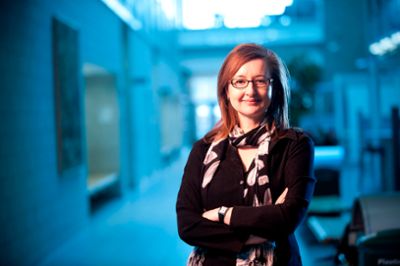Gemma Reguera named editor-in-chief of microbiology journal

Gemma Reguera, Michigan State University environmental microbiologist, was named editor-in-chief of Applied and Environmental Microbiology (AEM), one of two new editors for two of the 16 peer-reviewed journals published by the American Society of Microbiology (ASM). Reguera will begin her term on July 1.
The ASM Journals Committee selected Reguera to lead Applied and Environmental Microbiology based on her record as an exceptional scientist with real experience fostering the next generation of microbiologists and commitment to continuing that mission within the ASM Journals program. Patrick Schloss, chair of the ASM Journals Committee, further cited Reguera’s legacy with the society and commitment to build upon the success of AEM as key reasons behind her selection.
“I look forward to diversifying the journal’s science and scientists,” said Reguera, a professor in the Department of Microbiology and Molecular Genetics (MMG) in the MSU College of Natural Science, when discussing AEM’s future. “I will focus on expanding AEM’s scope beyond traditional areas to grow with research in the field, organizing more special topic issues and implementing novel initiatives to promote equity and inclusion.”
Reguera has a broad background in applied and environmental microbiology, with research projects spanning human, terrestrial, and anthropogenic environments. Her research builds on the enormous potential for advances that can be made when knowledge is generated and combined in new and unexpected ways. She is particularly interested in interdisciplinary approaches that harness microbial components, microorganisms and microbiomes as technologies that prevent human exposure to contaminants, pollutants, and pathogens.
Since joining Michigan State University in 2006, she’s led groundbreaking studies to describe the electric nature of some microbes. These studies have resulted in new paradigms in biological electron transfer and have established electromicrobiology as a new subfield in microbiology. Particularly important was the discovery of ‘electric’ microbes that produce protein nanowires to mineralize uranium and other toxic metals and to grow communities on electrodes that harvest current from organic wastes. Her interests go beyond the basic research and seek to develop sustainable technologies that harness the electrical activities and conductive cellular components of these organisms in bioremediation, nanotechnology, and bioenergy applications.
MMG chair and ASM president Victor DiRita is enthusiastic about Reguera’s appointment.
“The selection of Gemma as editor-in-chief of AEM is a commitment by the ASM to inclusive excellence at an important journal in the field of microbial science” DiRita said. “Gemma is a highly innovative researcher, a gifted mentor and a natural leader. The journal’s authors, reviewers, editors and readers will benefit tremendously from the talents she will bring to the job of editor-in-chief.”
The American Society for Microbiology is one of the largest professional societies dedicated to the life sciences with a membership of 30,000 scientists and health practitioners. ASM's mission is to promote and advance the microbial sciences.
Banner image: Since joining MSU in 2006, Reguera has led groundbreaking studies to describe the electric nature of some microbes. These studies resulted in new paradigms in biological electron transfer and have established electromicrobiology as a new subfield in microbiology. Particularly important was the discovery of ‘electric’ microbes that produce protein nanowires to mineralize uranium and other toxic metals and to grow communities on electrodes that harvest current from organic wastes (Illustrated above). Credit: Karl Gude